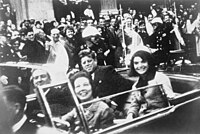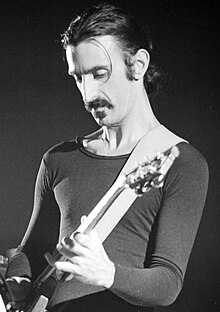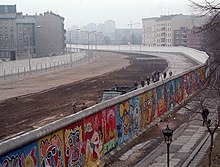The 1960s Portal
The 1960s became synonymous with the new, radical, and subversive events and trends of the period. In Africa the 1960s was a period of radical political change as 32 countries gained independence from their European colonial rulers. Some commentators have seen in this era a classical Jungian nightmare cycle, where a rigid culture, unable to contain the demands for greater individual freedom, broke free of the social constraints of the previous age through extreme deviation from the norm. Christopher Booker charts the rise, success, fall/nightmare and explosion in the London scene of the 1960s. However, this alone does not explain the mass nature of the phenomenon. Several nations such as the U.S., France, Germany and Britain turned to the left in the early and mid 1960s. In the United States, John F. Kennedy, a Keynesian and staunch anti-communist, pushed for social reforms. His assassination in 1963 was a stunning shock. Liberal reforms were finally passed under Lyndon B. Johnson including civil rights for African Americans and healthcare for the elderly and the poor. Despite his large-scale Great Society programs, Johnson was increasingly reviled by the New Left at home and abroad. The heavy-handed American role in the Vietnam War outraged student protestors across the globe, as they found peasant rebellion typified by Ho Chi Minh and Che Guevara more appealing. Italy formed its first left-of-center government in March 1962 with a coalition of Christian Democrats, Social Democrats, and moderate Republicans. Socialists joined the ruling block in December 1963. In Britain, the Labour Party gained power in 1964. In Brazil, João Goulart became president after Jânio Quadros resigned. This is a Featured article, which represents some of the best content on English Wikipedia..
 The 1969 Curaçao uprising (Papiamento: Trinta di Mei, 'Thirtieth of May') was a series of riots on the Caribbean island of Curaçao, then part of the Netherlands Antilles, a semi-independent country in the Kingdom of the Netherlands. The uprising took place mainly on 30 May but continued into the night of 31 May – 1 June 1969. The riots arose from a strike by workers in the oil industry. A protest rally during the strike turned violent, leading to widespread looting and destruction of buildings and vehicles in the central business district of Curaçao's capital, Willemstad. Several causes for the uprising have been cited. The island's economy, after decades of prosperity brought about by the oil industry, particularly a Shell refinery, was in decline and unemployment was rising. Curaçao, a former colony of the Netherlands, became part of the semi-independent Netherlands Antilles under a 1954 charter, which redefined the relationship between the Netherlands and its former colonies. Under this arrangement, Curaçao was still part of the Kingdom of the Netherlands. Anti-colonial activists decried this status as a continuation of colonial rule but others were satisfied the political situation was beneficial to the island. After slavery was abolished in 1863, black Curaçaoans continued to face racism and discrimination. They did not participate fully in the riches resulting from Curaçao's economic prosperity and were disproportionately affected by the rise in unemployment. Black power sentiments in Curaçao were spreading, mirroring developments in the United States and across the Caribbean, of which Curaçaoans were very much aware. The Democratic Party dominated local politics but could not fulfill its promise to maintain prosperity. Radical and socialist ideas became popular in the 1960s. In 1969, a labor dispute arose between a Shell sub-contractor and its employees. This dispute escalated and became increasingly political. A demonstration by workers and labor activists on 30 May became violent, sparking the uprising. (Full article...) This is a Good article, an article that meets a core set of high editorial standards.
 On the left, largely obscured, are #60 Sam DeLuca and #70 Sherman Plunkett. The 1961 San Diego Chargers season was the team's second in the American Football League. Following a move from Los Angeles, it was the Chargers' first season in San Diego, where the team remained until returning to Los Angeles in 2017. The Chargers won their first eleven games and clinched the Western Division by mid-November. They lost form in December, with only one victory in their final three regular season games, and finished at 12–2, six games ahead of runner-up Dallas. Like the previous season, the Chargers' season ended with a loss to the Houston Oilers in the AFL championship game, this time 10–3 at Balboa Stadium in San Diego. (Full article...) Selected picture - Attempting to block racial integration at the University of Alabama, Governor George Wallace (left) stands defiantly at the door on June 11, 1963, in an incident known as the Stand in the Schoolhouse Door. Wallace moved aside after being ordered to do so by President John F. Kennedy; years later, he became a born-again Christian and recanted his segregationist views.
Did you know -
Related portalsThis is a Featured article, which represents some of the best content on English Wikipedia..
Frank Vincent Zappa (/ˈzæpə/ ZAP-ə; December 21, 1940 – December 4, 1993) was an American musician, composer, and bandleader. In a career spanning more than 30 years, Zappa composed rock, pop, jazz, jazz fusion, orchestral and musique concrète works; he also produced almost all of the 60-plus albums that he released with his band the Mothers of Invention and as a solo artist. His work is characterized by nonconformity, improvisation sound experimentation, musical virtuosity and satire of American culture. Zappa also directed feature-length films and music videos, and designed album covers. He is considered one of the most innovative and stylistically diverse musicians of his generation. As a mostly self-taught composer and performer, Zappa had diverse musical influences that led him to create music that was sometimes difficult to categorize. While in his teens, he acquired a taste for 20th-century classical modernism, African-American rhythm and blues, and doo-wop music. He began writing classical music in high school, while simultaneously playing drums in rhythm and blues bands, later switching to electric guitar. His debut studio album with the Mothers of Invention, Freak Out! (1966), combined satirical but seemingly conventional rock and roll songs with extended sound collages. He continued this eclectic and experimental approach throughout his career. (Full article...) This is a Good article, an article that meets a core set of high editorial standards.
Leonid Ilyich Brezhnev (19 December 1906 – 10 November 1982) was a Soviet politician who served as General Secretary of the Communist Party of the Soviet Union from 1964 until his death in 1982, and Chairman of the Presidium of the Supreme Soviet (head of state) from 1960 to 1964 and again from 1977 to 1982. His 18-year term as General Secretary was second only to Joseph Stalin's in duration. Brezhnev was born to a working-class family in Kamenskoye (now Kamianske, Ukraine) within the Yekaterinoslav Governorate of the Russian Empire. After the results of the October Revolution were finalized with the creation of the Soviet Union, Brezhnev joined the Communist party's youth league in 1923 before becoming an official party member in 1929. When Nazi Germany invaded the Soviet Union in June 1941, he joined the Red Army as a commissar and rose rapidly through the ranks to become a major general during World War II. Following the war's end, Brezhnev was promoted to the party's Central Committee in 1952 and became a full member of the Politburo by 1957. In 1964, he consolidated enough power to replace Nikita Khrushchev as First Secretary of the CPSU, the most powerful position in the country. (Full article...) Selected article -The Berlin Wall (German: Berliner Mauer, pronounced [bɛʁˌliːnɐ ˈmaʊɐ] ⓘ) was a guarded concrete barrier that encircled West Berlin from 1961 to 1989, separating it from East Berlin and the German Democratic Republic (GDR; East Germany). Construction of the Berlin Wall was commenced by the government of the GDR on 13 August 1961. It included guard towers placed along large concrete walls, accompanied by a wide area (later known as the "death strip") that contained anti-vehicle trenches, beds of nails and other defenses. The primary intention for the Wall's construction was to prevent East German citizens from fleeing to the West. The Soviet Bloc propaganda portrayed the Wall as protecting its population from "fascist elements conspiring to prevent the will of the people" from building a communist state in the GDR. The authorities officially referred to the Berlin Wall as the Anti-Fascist Protection Rampart (German: Antifaschistischer Schutzwall, pronounced [antifaˌʃɪstɪʃɐ ˈʃʊtsval] ⓘ). Conversely, West Berlin's city government sometimes referred to it as the "Wall of Shame", a term coined by mayor Willy Brandt in reference to the Wall's restriction on freedom of movement. Along with the separate and much longer inner German border, which demarcated the border between East and West Germany, it came to symbolize physically the Iron Curtain that separated the Western Bloc and Soviet satellite states of the Eastern Bloc during the Cold War. (Full article...) More Did you know (auto generated)
TopicsCategoriesWikiProjects
Associated WikimediaThe following Wikimedia Foundation sister projects provide more on this subject:
Discover Wikipedia using portals |




























